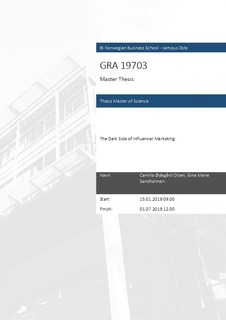The Dark Side of Influencer Marketing
Master thesis
Permanent lenke
http://hdl.handle.net/11250/2622034Utgivelsesdato
2019Metadata
Vis full innførselSamlinger
- Master of Science [1621]
Sammendrag
Influencer marketing has over time evolved into a trend within marketing, and more
businesses uses it as a tool as they consider this to be an accurate and effective way
of doing marketing. As this new trend of marketing products and services has
received lot of positive publicity, it's easy to forget that influencer marketing, like
many other trends, also has its downsides. This paper addresses the disadvantages
associated with influencer marketing, where we want to look further into how
negative behavior from an influencer, collaborating with a brand, affects both the
influencer and the brand.
We want to contribute to the literature by two different studies. Our first study
addresses micro influencers negative behavior, by performing between subjects
experiments with pre- and post tests. We seek to understand how brands and
influencers will be affected due to influencers negative behavior, and if different
combinations of influencers (lifestyle- and expert influencers), products (hedonic
or utilitarian) and comment section (none, positive or negative) will moderate this
effect. We found it to be some differences related to this as expert influencers, when
combined with utilitarian products and no comment section, received lower attitude
scores from participants on the micro influencers perceived expertise. We found
social proof to have an effect when expert influencers were paired with hedonic
products. Here, we saw that participants evaluated the expert influencer less
favorable when a negative comment section was added.
Besides this, marketing products through influencers makes an illusion of the
promoted product being a recommendation rather than commercial, which let us
believe that influencers will take most of the harm related to negative publicity for
bad behavior. We found that brands who collaborates with negatively behaving
influencers will experience some form of fallback, as respondents attitude and
willingness to purchase the product decreased after treatment. Furthermore, we
found this decrease in attitude to be larger for the negatively behaving influencer
than for the brand. Our second experiment addresses self congruence. We believe that consumers are
more able to identify more with influencers as they fall somewhere between
celebrities and personal relations. We find this relevant as brands today have to
make trade offs related to whether they should appeal to consumers actual- or ideal
self in their marketing. This second study is therefore constructed to compare how
consumers relate to influencers and celebrities, and found that respondents had
greater ability to compare their actual self towards influencers rather than
celebrities.
Beskrivelse
Masteroppgave(MSc) in Master of Science in Strategic Marketing Management - Handelshøyskolen BI, 2019
